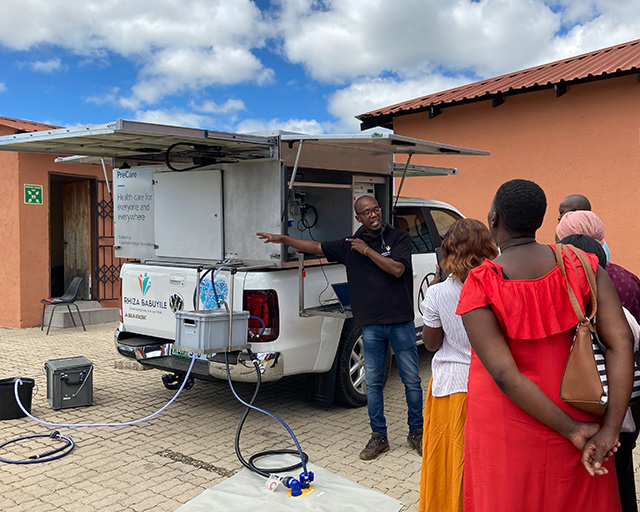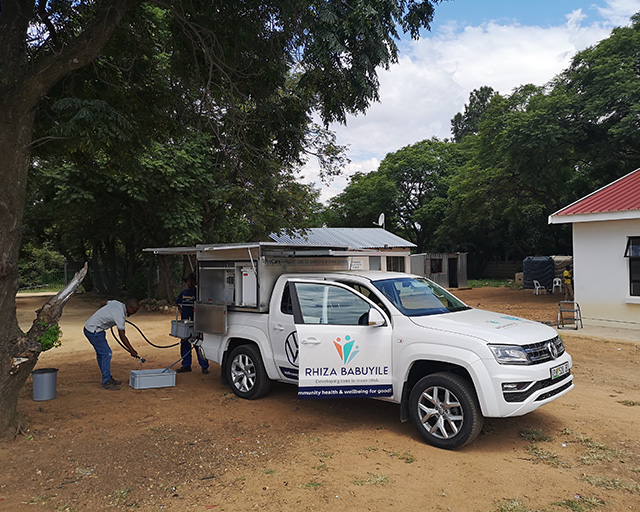
PreCare – Health Care for Everyone and Everywhere

In rural regions of Africa, poor accessibility is often a major obstacle to providing people with comprehensive medical care. In the “PreCare – Health Care for Everyone and Everywhere“ project, an international team from two Fraunhofer Institutes and the Stellenbosch University is developing cost-effective modular solutions for pickups that will enable preclinical examinations, tests, and vaccinations to be carried out even in less accessible areas.


Creating perspectives prospects for Africa in Africa is a task of global interest for humanitarian and strategic economic reasons. The challenges are immense: more than 1.5 million people die every year in the Sub-Saharan region of Africa alone from the four most common diseases malaria, HIV/AIDS, COVID-19, and tuberculosis[1]. The reasons for this are often a lack of health care and hygiene, especially in remote areas. At the same time, the people themselves are often very limited in their mobility. As a result, it is often almost impossible to carry out comprehensive examinations for the early detection of diseases, systematic data collection to determine epidemic situations, the implementation and tracking of nationwide vaccination, medication and education campaigns, and direct contact between patients and healthcare professionals. The challenge is therefore to develop medical supply units that can penetrate very deep into the interior of the country, i.e. have the appropriate off-road capability, and can also be produced in large numbers at low cost.
The care platform
The mobile care platform developed by researchers from the Fraunhofer Institutes for Surface Engineering and Thin Films IST and for Solar Energy Systems ISE together with Stellenbosch University as part of the PreCare project funded by the Fraunhofer Future Foundation consists of a cabin that contains modular supply elements such as a water treatment plant, on-board disinfectant production, a refrigerator and a telecommunication unit, and can also accommodate medical devices, medical substances and test equipment. A photovoltaics generator in combination with a backup battery provides the entire unit with a permanent, self-sufficient power supply. A laptop with satellite link and Bluetooth-enabled examination devices, such as a blood pressure monitor or electrocardiogram (ECG), will enable patients to receive telemedical consultations from medical professionals on site and thus contribute to better health education in the future.
Nine-month test phase in collaboration with local NGO
The first prototype of the mobile care platform was handed over to the non-profit organization Rhiza Babuyile in March 2023 for a nine-month test phase, where it was used in various centers for the disabled in the municipality of Daantjie (Mpumalanga region, South Africa). In addition to monitoring vital signs, including blood pressure measurements and ear, nose, eye and throat examinations, HIV tests were primarily carried out as part of general health education and consultation.
Improvement in the general state of health of the patients cared for
The evaluation of the treatments and examinations shows that around 120 patients per month made use of the so-called “PreCare“ services. As a result, the health conditions in the affected centers were measurably improved in the first eight months of the platform's operation: On the one hand, patients with chronic illnesses took the necessary medication more reliably, and on the other hand, hygienic conditions were significantly improved thanks to access to disinfected water from the “PreCare“ platform, thus reducing complications.
Outlook: Near-series testing planned in Namibia
After consultation with all parties involved the evaluation phase of the platform, which was originally planned until the end of 2023, will be extended by a further six months up to and including June 2024 in order to test the prototype further in the field and incorporate the findings into the development and design of a second prototype that is closer to series production. At the same time, another NGO, Mudiro e.V., has been secured for the future trial operation of a second platform in Namibia. This platform will be manufactured entirely in Africa and is scheduled to go into operation in April 2024 as part of a one-year program for the early detection and prevention of cervical cancer.
The project
This project was funded by the Fraunhofer Future Foundation.
[1]
Bell, David, Hansen, Kristan Schultz, 2021, “Relative burdens of the COVID-19, malaria, tuberculosis, and HIV/AIDS epidemics in sub-Saharan Africa” American Journal of Tropical Medicine and Hygiene, Vol. 105, No. 6, pp. 1510-1515, 0002-9637, doi10.4269/ajtmh.21-0899.
